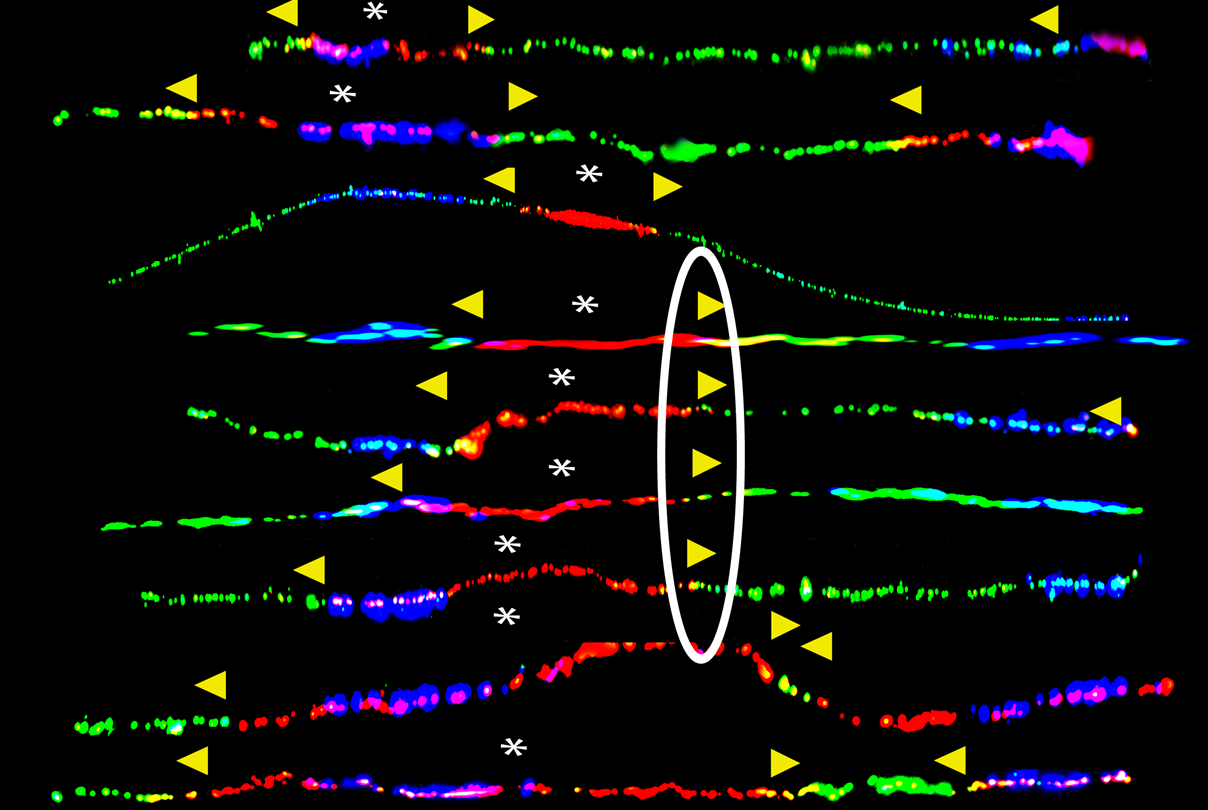Researchers from Weill Cornell Medicine have discovered that people who inherit a mutant copy of the BRCA1 gene may develop mutations and cancer due to error-prone DNA replication and repair. The research has the potential to help patients with certain mutations avoid developing cancer.
 Stalled replication forks (yellow arrows) are detected at the BRCA1 gene in cells containing a BRCA1 germline mutation. Image Credit: Drs Deshpande and Gerhardt.
Stalled replication forks (yellow arrows) are detected at the BRCA1 gene in cells containing a BRCA1 germline mutation. Image Credit: Drs Deshpande and Gerhardt.
The work, published on September 12th, 2022, in Molecular Cell, sheds new light on why people who inherit a mutation in one copy of the BRCA1 gene frequently develop abnormalities in their remaining normal copy of the BRCA1 gene, paving the way for malignancies to develop.
When these people’s cells are stressed, replication of the normal BRCA1 gene slows due to extremely repetitive DNA regions in the gene that form physical obstacles to DNA-copying machinery. An error-prone DNA repair process kicks in to fix the stall.
We have identified some of the first steps in cancer development in people carrying inherited BRCA1 mutations.”
Dr Jeannine Gerhardt, Study Senior Author and Assistant Professor, Stem Cell Biology, Obstetrics and Gynecology, Weill Cornell Medicine
Dr Jeannine Gerhardt is also associated with the Ronald O. Perelman and Claudia Cohen Center for Reproductive Medicine.
Dr Madhura Deshpande, a research associate in the Center for Reproductive Medicine at Weill Cornell Medicine, said that the BRCA1 gene encodes a crucial DNA-repair protein. According to Dr Deshpande, persons who inherit one mutant and one normal copy produce around half as much of this DNA-repair protein as individuals who inherited two normal copies.
The researchers analyzed DNA replication in human embryonic stem cells and human breast epithelial cells with one mutant copy of the BRCA1 gene to identify why the remaining functional BRCA1 gene copy frequently becomes defective as well. Dr Nikica Zaninovic and Dr Zev Rosenwaks created the human embryonic stem cells at the Center for Reproductive Medicine.
They subjected the cells to a substance to replicate environmental stress. They observed that when the DNA in these cells unzips into two strands to create a copy of the DNA for each new cell, the machinery that replicates the DNA stops at the BRCA1 gene due to the repetitive DNA sequences in the gene.
The researchers also revealed, for the first time, that the BRCA genes are unstable and prone to breaking. Since the cells only have half as much BRCA1 protein to repair the breaks, they resort to a more error-prone backup DNA repair method known as microhomology-mediated break-induced replication (MMBIR), according to Dr Deshpande.
The researchers also looked at tumor cells from women who had breast cancer caused by hereditary BRCA1 mutations. They discovered alterations in the BRCA1 and BRCA2 genes, such as deletions and insertions, that were most likely produced by the flawed MMBIR process.
We are currently interested in finding other additional error-prone repair mechanisms that might contribute to the genomic instability and mutagenesis in these cells.”
Dr Madhura Deshpande, Research Associate, Center for Reproductive Medicine, Weill Cornell Medicine
Dr Gerhardt stated that the team is also investigating real-world environmental stresses that cause replication issues and incorrect DNA repair in BRCA1-linked breast tumors.
The team is also researching techniques to restrict the usage of error-prone DNA repair processes in women with hereditary BRCA1 mutations. For instance, researchers are investigating the preventive effects of dietary components associated with a lower risk of breast cancer in BRCA1 mutation carriers.
If they are effective, they may be able to find drugs or other interventions that could avert cancer in women who have inherited BRCA1 mutations, providing an alternative to current invasive preventive methods such as pre-emptive mastectomy or ovary removal.
I believe we can intervene and find compounds that will prevent patients with inherited BRCA1 mutations from accumulating mutations that lead to cancer.”
Dr Jeannine Gerhardt, Study Senior Author and Assistant Professor, Stem Cell Biology, Obstetrics and Gynecology, Weill Cornell Medicine
Source:
Journal reference:
Deshpande, M., et al. (2022) Error-prone repair of stalled replication forks drives mutagenesis and loss of heterozygosity in haploinsufficient BRCA1 cells. Molecular Cell. doi.org/10.1016/j.molcel.2022.08.017.